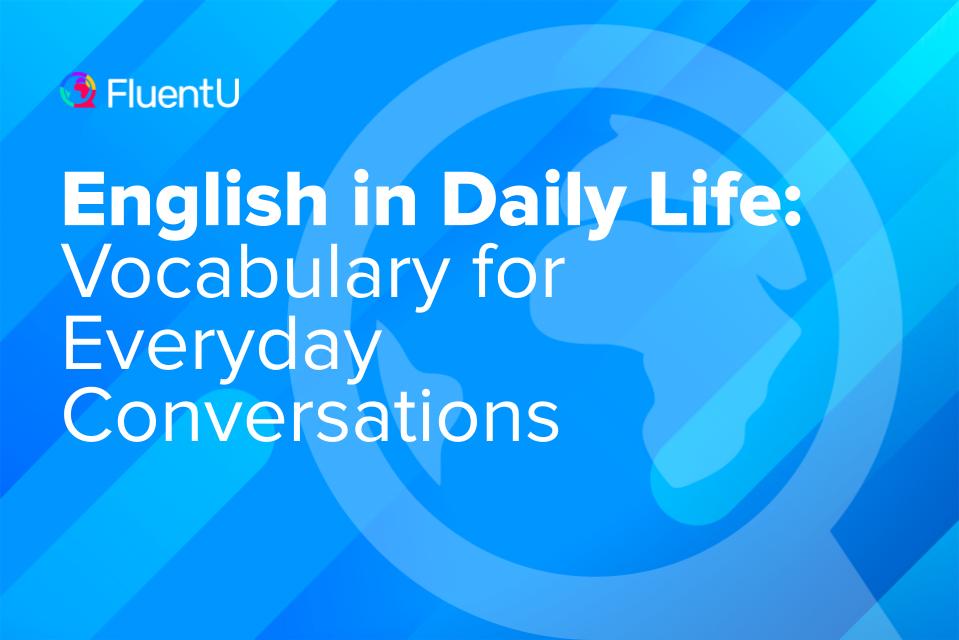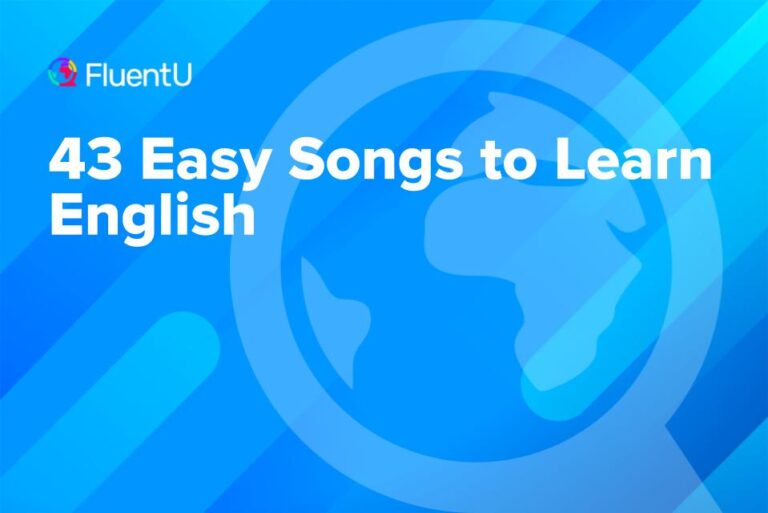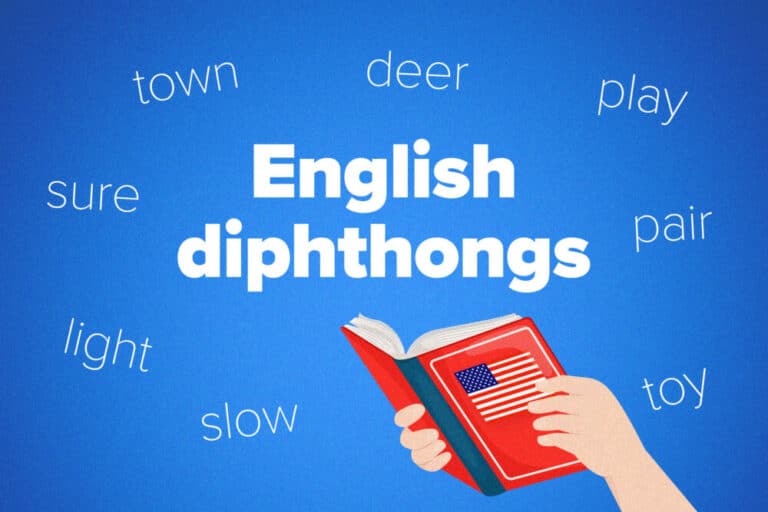English in Daily Life: Vocabulary for Everyday Conversations

Sometimes, basic English conversations are the most complicated ones. In daily life, English speakers talk quickly: They use lots of slang, they make jokes and cultural references that you might not understand.
This article will provide comprehensive English vocabulary lists that you can use in daily life situations.
Download: This blog post is available as a convenient and portable PDF that you can take anywhere. Click here to get a copy. (Download)
Typical English Greetings for Daily Life
- Hello!
- Hi!
- Hey!
- Good morning!
- Good afternoon!
- Good evening!
- How are you?
- How’s it going?
- What’s up?
- How’s everything?
- How’s your day?
- What’s new?
- How have you been?
- How’s life treating you?
- Long time no see!
- It’s nice to see you!
- Nice to meet you!
- What’s going on?
- How’s your weekend?
- How’s your day going so far?
- What have you been up to?
- How’s the weather today?
Resources for Learning Typical English Greetings
English greetings help you confidently introduce yourself to native English speakers and make new friends. Therefore, greetings are not just an important part of daily English, but also your ticket to many other everyday English conversations.
English Like a Native has a great video explaining some common English greetings and helping you practice your pronunciation. This video is helpful because it explains when to use each greeting and shows which phrases are more formal or more common.
If you want a little more practice before you head off to use these greetings in your daily life, iSLCollective has some useful worksheets that you can print out. You can fill them out on your own to make sure you understand how to use these English greetings in your daily life.
English for Restaurants
Ordering:
- Can I take your order?
- What would you like to eat?
- What can I get for you?
- Are you ready to order?
- I’ll have the
- I’d like to order
- May I get the
- Can I start with
- What’s your special today?
Menu Items:
Specific Requests:
- Can I have it [rare/medium/well-done]?
- Extra [ingredient]
- Dressing on the side
- Is it spicy?
- Is it sweet?
- Can you make it milder?
Drinks:
Table Service:
- Are you ready for the check?
- Can I get you anything else?
- Enjoy your meal
- Can I wrap that up for you?
Paying:
Common Phrases:
- I’ll have the same
- What’s the soup of the day?
- I’m allergic to [ingredient]
- Is there a children’s menu?
- Do you have any recommendations?
- Is there a wait for a table?
Resources for Learning English for Restaurants
JamesESL has a great video to help you form some questions and sentences. His video uses a slow pace to help you follow along, and he tries to make the conversation easy but also detailed enough to get you through the restaurant experience without feeling stressed.
If you want to learn more detailed restaurant conversations, take a look at Mad English TV, where you will learn tons of different examples of daily conversations. This video covers fast food and traditional sit-down restaurants, and addresses some situations or problems you might face when eating at a restaurant.
Bringing Your English Skills into the Classroom
Classroom Phrases:
- May I come in?
- Can I have a seat?
- Can you repeat that, please?
- What’s the homework?
- When is it due?
- Is there a test today?
- I have a question
- I don’t understand
- Can you help me?
- I need extra time
- I’m finished
Subjects:
- Math
- Science
- History
- English
- Geography
- Art
- Music
- Physical Education (PE)
- Social Studies
- Biology
- Chemistry
- Physics
- Literature
School Supplies:
- Notebook
- Pen
- Pencil
- Eraser
- Textbook
- Folder
- Calculator
- Ruler
- Backpack
- Lunchbox
- Computer
- Notebook paper
- Glue
- Scissors
- Highlighter
Directions and Locations:
- Where’s the library?
- How do I get to the gym?
- Go to the principal’s office
- Follow the signs to the cafeteria
- The classroom is on the second floor
- It’s down the hall to the left
Assessment and Grades:
Teachers and Staff:
School Events and Activities:
- Field trip
- Club meeting
- Sports practice
- School assembly
- Graduation ceremony
- School play
- Science fair
Common Phrases:
- I need help with my homework
- Can you explain this to me?
- I’m going to the library to study
- I have a presentation tomorrow
- I missed class last week
- What’s for lunch today?
- I have a lot of homework to do
- I aced the test!
- I’m late for class
Resources for Learning English for School
Two Minute English has a video with several examples of everyday English conversations you might have while at school. It also explains some vocabulary words that are used in a classroom but you might not have learned.
Another great resource for practicing classroom conversations is Scribd. This site has a document full of common classroom phrases that you can download. The conversations are listed in the order you might hear them in a classroom setting, and are separated into categories to help you understand.
It also teaches you some words that you might hear as part of your teacher’s instructions and questions that you can ask if you do not understand a lesson.
English for Daily Life at the Workplace
Getting Started:
- Let’s get to work
- Time to start the day
- First things first
- Ready to begin?
- What’s on the agenda?
- We have a busy day ahead
Meetings and Discussions:
- Let’s schedule a meeting
- Can we set up a conference call?
- I’d like to discuss
- What’s the agenda for the meeting?
- Please take a seat
- Let’s go over the details
- Any questions or comments?
- I’d like to hear your input
- Let’s brainstorm ideas
- Can we wrap this up?
Tasks and Projects:
- What’s my task for today?
- I’ll work on that
- I’m making progress
- I’m almost done
- I need help with this
- Can you assist me?
- I’ll meet the deadline
- Let’s collaborate on this
- Project update
- We need to meet our goals
Supervision and Feedback:
- How am I doing?
- Any feedback for me?
- I appreciate your guidance
- Is there room for improvement?
- Let’s review your performance
- Keep up the good work
- You’re doing a great job
Office Tools and Technology:
- Spreadsheet
- Presentation
- Database
- Software
- Hardware
- Internet
- Intranet
- Password
- Access code
- Printer
- Scanner
- Copier
- Phone
- Voicemail
Professional Language:
- Networking
- Client
- Deadline
- Productivity
- Strategy
- Report
- Proposal
- Budget
- Profit
- Loss
- Business plan
- Investment
- Market analysis
Interactions with Colleagues:
- Let’s grab a coffee
- Can I join you for lunch?
- Happy hour after work?
- How’s your day going?
- I appreciate your help
- Thanks for the support
- Let’s celebrate our success
Policies and Procedures:
- Dress code
- Attendance policy
- Safety protocol
- Company handbook
- Human resources
- Compliance
- Code of conduct
- Benefits package
- Paid time off
- Sick leave
- Maternity leave
- Vacation days
Resources for Learning English for Work
If your daily life includes speaking English at work, you might want to check out some of the videos by Learn English in Hamza’s Classroom. The video below gives sample conversations that people might have at the workplace.
Each sentence is repeated twice to give you time to listen and understand. It also provides subtitles so you can read along.
You may also need to practice English in order to get a job. Learn English with Emma gives great advice for all things related to the job search. She will help you understand common English questions you will hear in an interview, and she uses easy-to-understand but detailed language to help you through the process of finding a job.
Basic English Conversation Skills
To master English for daily life, basic conversation skills are essential
ESL Fast provides a list of sample conversations you are likely to encounter in daily life. These are topics that you might talk about with a friend, coworker or classmate. They are simple and easy to follow and include an audio recording so that you can listen to the conversation while you read.
When adding English to your daily life, it is also important to know how to talk about common activities. Woodward English is a great place to practice this skill, thanks to this list of daily routine vocabulary. The list comes with helpful pictures. This site also includes lots of example sentences and a quiz to test your learning.
Fun Ways to Make English Part of Your Daily Life
In order to learn a language, it is important to practice every day. And the easiest way to practice English every day is finding fun ways to learn, so you do not get bored and quit.
Here are some fun and simple ways to practice English every day, depending on your personal interests:
- Try reading a great story or a comic book in English. You might be surprised at how much English vocabulary you learn when you are entertained!
- The same goes for watching movies. You will be so entertained by the movies that you will not even realize how much English you are learning. You can also try watching shorter videos, like those on FluentU.
FluentU takes authentic videos—like music videos, movie trailers, news and inspiring talks—and turns them into personalized language learning lessons.
You can try FluentU for free for 2 weeks. Check out the website or download the iOS app or Android app.
P.S. Click here to take advantage of our current sale! (Expires at the end of this month.)

- English music is a fun tool to practice listening every day. This will help you practice pronunciation and get used to English phrases.
- Find a friend or a group of friends who speak or are learning English. Then, practice common, everyday phrases and expressions. Try to act out common scenes like making weekend plans or eating at a restaurant.
The topics included in this post are related to some of the most common conversations you will find (and have!) in daily life.
Practice these phrases and vocabulary words so that you can carry English into your daily life and speak like a native. Make sure to incorporate English learning into your life every day through music, movies and other fun English activities.
Even 10 minutes of daily practice will help you improve your conversational skills!
Download: This blog post is available as a convenient and portable PDF that you can take anywhere. Click here to get a copy. (Download)
And One More Thing...
If you like learning English through movies and online media, you should also check out FluentU. FluentU lets you learn English from popular talk shows, catchy music videos and funny commercials, as you can see here:
The FluentU app and website makes it really easy to watch English videos. There are captions that are interactive. That means you can tap on any word to see an image, definition, and useful examples.
For example, when you tap on the word "searching," you see this:
Learn all the vocabulary in any video with quizzes. Swipe left or right to see more examples for the word you’re learning.

FluentU helps you learn fast with useful questions and multiple examples. Learn more.
The best part? FluentU remembers the vocabulary that you’re learning. It gives you extra practice with difficult words—and reminds you when it’s time to review what you’ve learned. You have a truly personalized experience.
Start using the FluentU website on your computer or tablet or, better yet, download the FluentU app from the iTunes or Google Play store. Click here to take advantage of our current sale! (Expires at the end of this month.)















